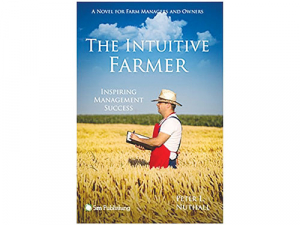Wired for Science: Understanding the feeding habits of mealybug
Fussy children might be frustrating, but fussy mealybugs could help protect the New Zealand wine industry from grapevine leafroll-associated virus 3.
 The research examines how farmers make their decisions, the role intuition plays and how it can be improved.
The research examines how farmers make their decisions, the role intuition plays and how it can be improved.
A Lincoln University researcher investigating the role of intuition in farmers’ decisionmaking has had his work published in a scientific journal and as a novel.
Dr Peter Nuthall and Dr Kevin Old, from the department of land management and systems, have been examining how farmers make their decisions, the role intuition plays and how it can be improved.
Their analysis of farmers’ intuitive decisionmaking is published in Journal of Rural Studies (‘Intuition, the farmers’ primary decision method. A review and analysis’), and Nuthall has published a novel on the same theme.
His novel, The Intuitive Farmer: Inspiring Management Success, tells of a group of farmers who meet to discuss management challenges and skills associated with intuition. Guided by meeting facilitators, the farmers sort out each other’s decision problems, learning and taking on board the lessons. And a new novel will guide farmers through the process of modifying their management style.
The book is available through most international online book sellers, including its publisher 5M.
Nuthall and Old gathered data from at least 700 farmers.
“Farmer intuition has never been analysed to this extent before,” said Nuthall.
The research showed that farmers base most decisions on their intuition. They do not formally analyse each decision but use their mental powers to decide what to do.
“Sometimes a decision is instantaneous, but in others a range of thought levels are brought to bear before acting. Good decision intuition is not a mysterious process,” said Nuthall.
“Profit and other assessments show some farmers are good intuitive decisionmakers, others not so good.”
Farmers with little experience, whether or not they are naturally intuitive, found it difficult to make good decisions.
Nuthall said the intuition process often uses ‘pattern matching’, in which the brain uses experience to match past events with a current problem requiring a decision.
“The farmer [then intuitively] comes up with what the brain believes to be the correct action.”
However, intuition was more than just pattern matching.
“Intuition develops with a farmer’s thought process, self-criticism and review.”
The new research showed how farmers can improve their intuition, he says.
The World Wide Sires National All Day Breeds Best Youth Camp Best All Rounder plaudit has become family affair, with 2026 Paramount Cup winner Holly Williams following in her sister Zara's footsteps.
DairyNZ is giving New Zealand farmers a unique opportunity to gain hands-on governance and leadership experience within the dairy sector.
Herd improvement company LIC has posted a 5.2% lift in half-year revenue, thanks to increasing demand for genetics.
According to the latest Fresh Produce Trend Report from United Fresh, 2026 will be a year where fruit and vegetables are shaped by cost pressures, rapid digital adoption, and a renewed focus on wellbeing at home.
The Roar is a highlight of the game hunting calendar in New Zealand, with thousands of hunters set to head for the hills to hunt male stags during March and April.
OPINION: The past few weeks have been tough on farms across the North Island: floods and storms have caused damage and disruption to families and businesses.
OPINION: Fonterra may be on the verge of selling its consumer business in New Zealand, but the co-operative is not…
OPINION: What does the birth rate in China have to do with stock trading? Just ask a2 Milk Company.